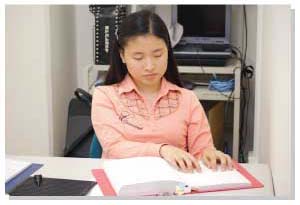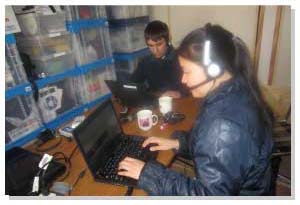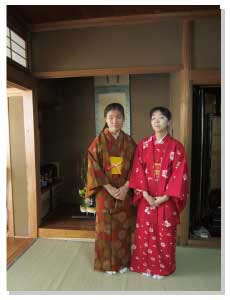- HOME
- Alumni News
- Dao Thu Huong (13th trainee)
- Huong's Final Report
Huong's Final Report
Rainbow of my experiences in Japan
1. Rose : my arrival in Japan
Setting foot in Japan for the first time was an unforgettable moment in the rosy dawn of August 30th, 2011. The 10-month Duskin training was laid out before me, filled with interesting lessons and moments—all waiting to be discovered by me.
I met Ms. Okuhira, Ms. Takizawa, Ms. Nasu, and other trainees on that first day. Everyone was very friendly, helpful, and warm-hearted. After a little hesitation, we quickly got acquainted with each other; it marked the beginning of our friendship during the course.
All of us attended a magnificent opening ceremony at the Duskin office on September 1st. When receiving the certificate, I felt very happy, honoured, and proud to become a member of the Duskin family. I was committed to do my best to achieve my study goals in the coming 10 months.
2. My training in sparkling colours
2.1. Yellow: Japanese classes
For the first three months, all the trainees were accommodated in the Toyama Sunrise, a barrier-free, comfortable, and safe building for persons with disabilities (PWDs). We studied there together everyday. To attain our training objectives, we first had to be equipped with the essential tool: the Japanese language. The course started in the golden sunshine of Japan’s autumn. Our teachers were very professional, creative and jolly. Though it was an intensive course to accomplish the elementary Japanese proficiency level, our class hours were not stressful at all. On the contrary, they were always overflowing with exciting conversations, games, and jokes. My teachers’ methods were flexible and appropriate for each student with different disabilities. Instead of employing pictures, for instance, they gave me quizzes by explanations or sounds since I could not see. I was so pleased to attend such an integrated class where we, with different types of disabilities, were able to study together harmoniously. I learnt a lot from my teachers – not only the interesting Japanese language but also their teaching strategies. After a few weeks, I was delighted to become capable of writing weekly reports in Japanese, make simple conversations with the JSRPD staff and other Japanese people, and pass the Japanese language proficiency test when the course was over. I want to send my deep thanks to all my Japanese teachers.

2.2. Orange: Hiratsuka School for the Blind and Tsukuba Technical University
As my passion is supporting education for the visually-impaired (VI), I took my individual training at different schools and welfare centres in Japan to accomplish my learning programme. It commenced with the 10-day studying at Hiratsuka School for the Blind in Kanagawa Prefecture. I attended class hours of various subjects: all were very practical and exciting and full of exercises and activities. All teaching materials I saw at this institution provided me with the most valuable lesson, the nature of education for the blind: All visible items should be made tactile for VI students, so that they can acquire knowledge by their hands.
I went to Tsukuba Technical University in the pink cherry blossom season in April. After attending informative lectures on Japanese PWDs’ history and welfare services by respectable and dedicated professors there, I have designed outlines of two training programmes for the teachers and volunteers of the VI. I would like to express my gratitude to all lecturers for helping me realise my dream of capacity development for teachers and volunteers of disabled students in Vietnam.
2.3. Pink: numerous field visits
My knowledge on Japan’s education and welfare system for PWDs improved enormously during my course at the Light Friend Association (Koyukai), Urawa University and the Nippon Lighthouse. I visited some Braille libraries, Braille publishers, rehabilitation and vocational training centres, and special schools for PWDs. Never can I forget the inventive communication methods at the private school for multiple disabilities in Yokohama, the history of education for the VI recited at the Kyoto School for the Blind, the well-facilitated inclusive education for the VI at the Hotarugaike Primary School, and the daily life and occupations of the deafblind persons I learnt at the Fureai No Sato Donguri Centre in Tokyo and many, many other places. Each of them lit up in me different ideas of changing lives of Vietnamese PWDs and the society’s perception on PWDs.
2.4. Purple: Daisy training
The longest phase of my individual training was spent in learning the latest technology of producing accessible digital books for those with print disabilities at the Assistive Technology Development Organization (ATDO). After 5 weeks, I was able to create several samples in the audio and multimedia DAISY formats. It was an inspiring start of my plan on supplying accessible textbooks for blind students in Vietnam.

3. Peaceful green of the Japanese culture
My training was interspersed with several home-stay experiences with Japanese families, which was a wonderful opportunity for me to experience the Japanese culture. Though being overseas, I had a cosy New Year with Sayaka’s family in Gifu Prefecture, enjoying delicious traditional Japanese meals, doing Origami, and visiting Yasaka Shrine to give prayers for the New Year. In Osaka, my host families Mr. Takeshita and Ms. Shimizu took me to Mino National Park, and many temples and also to Arashiyama in Kyoto. Moreover, I was very lucky and happy to be dressed in beautiful kimonos twice to take memorable pictures. Everywhere I went, I was received with warm smiles and polite and helpful attitudes of Japanese people. I truly love the taste of miso soup, Japanese people’s courtesy and kindness towards PWDs, and the exquisiteness of Origami, Ikebana, and the temples’ architecture. It is possible to say that similarities to Japanese culture cannot be found anywhere in the world.

4. The bright red of challenges
It would be an oversight if I did not mention my own fear and reluctance I had to overcome for many times to get the fantastic experiences in Japan. On a chilly day in early December, I went to a nearby supermarket alone with my white cane in hand and managed to do shopping and come back to Toyama Sunrise safely – I had never done such a thing before. From that moment, my independent life in Japan started.
During the first 3 months, I went to swimming class once a week. At the beginning, I was very fearful of water. However, with my trainers’ patient and professional instructions, my fear disappeared: I managed to breathe in the water and swim some metres. I am pleased that the water has become friendly to me.
The ski training in Niigata was a unique opportunity that I might never have in my tropical country. Interestingly, each of the trainees, with suitable facilities and support, enjoyed this sport in his/her own way. For me, after practising step by step, I could eventually listen to my instructor’s guidance to ski alone. It was a superb feeling gliding on the white snow carpet from the summit of the mountain downhill in the snowfall.
I did enjoy many other sports, such as tandem cycling, rock climbing, sound table tennis etc. All were great fun, and I intend to introduce them to Vietnamese PWDs.
5. Azure: My bright future
Duskin has lifted my wings to fly into the sky of civilized education for the VI. Returning to Vietnam, I am going to conduct projects to support facilities and services for VIs to study. Collaborating with my partners, I wish to establish a support center for students with disabilities like those in Japan’s universities. With my conviction, I desire to contribute my efforts to improve the study conditions for the PWDs in Vietnam.
6. Conclusion
The Duskin Ainowa Foundation has greatly helped to enhance mutual understandings among different types of disabilities and to achieve human rights of PWDs. I am motivated a lot by Japanese PWDs’ determination, perseverance, and strategies in their movements to change society. Furthermore, what I have learnt in Japan strengthened my belief that PWDs can do everything they wish with proper assistance. I would like to extend my ocean thanks to my sponsors and coordinators for having offered me this wonderful training programme, to all teachers for their provision of knowledge and skills, to all my host families for so much care and love, and to all my Japanese friends for kind support. Duskin is really a great source of inspiration for my future journey.




